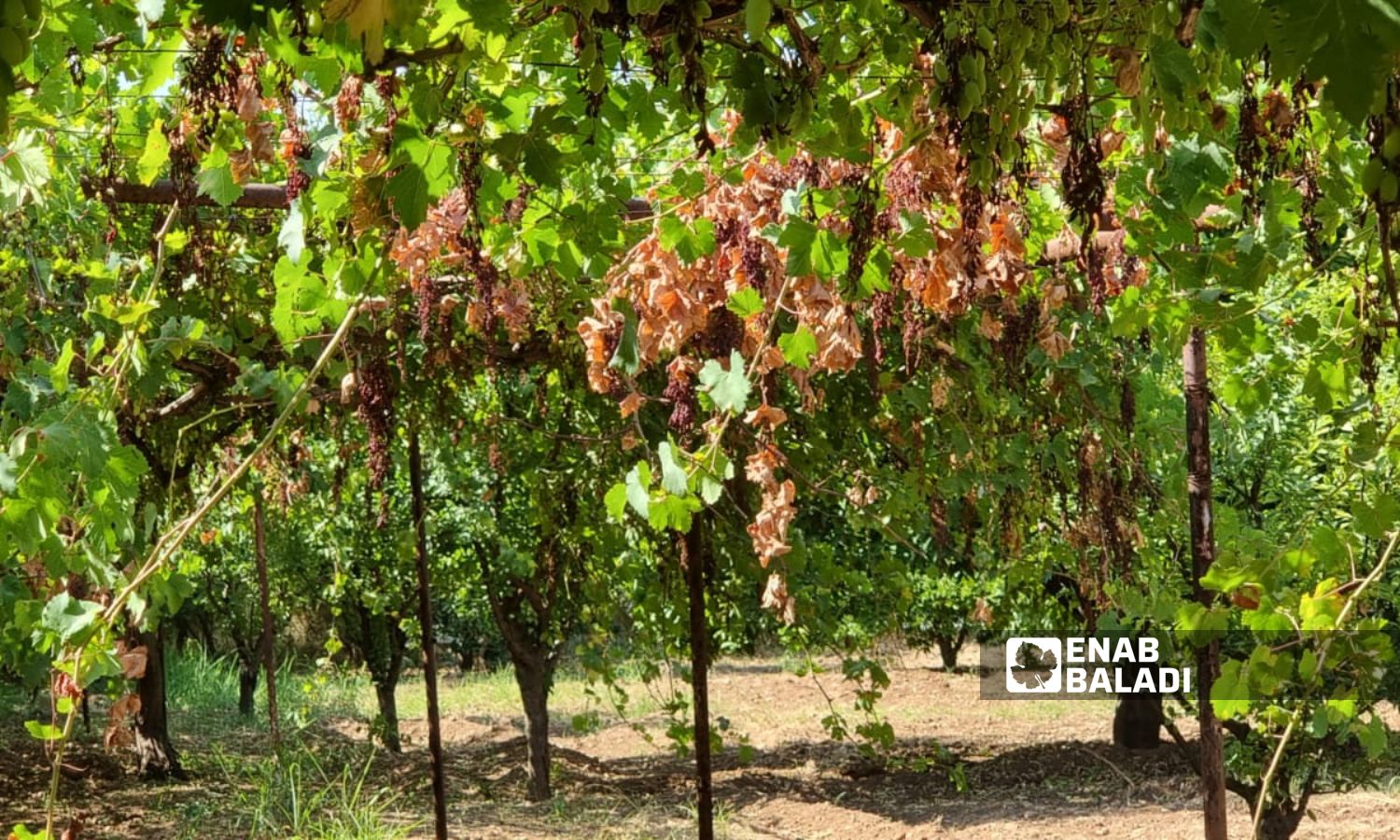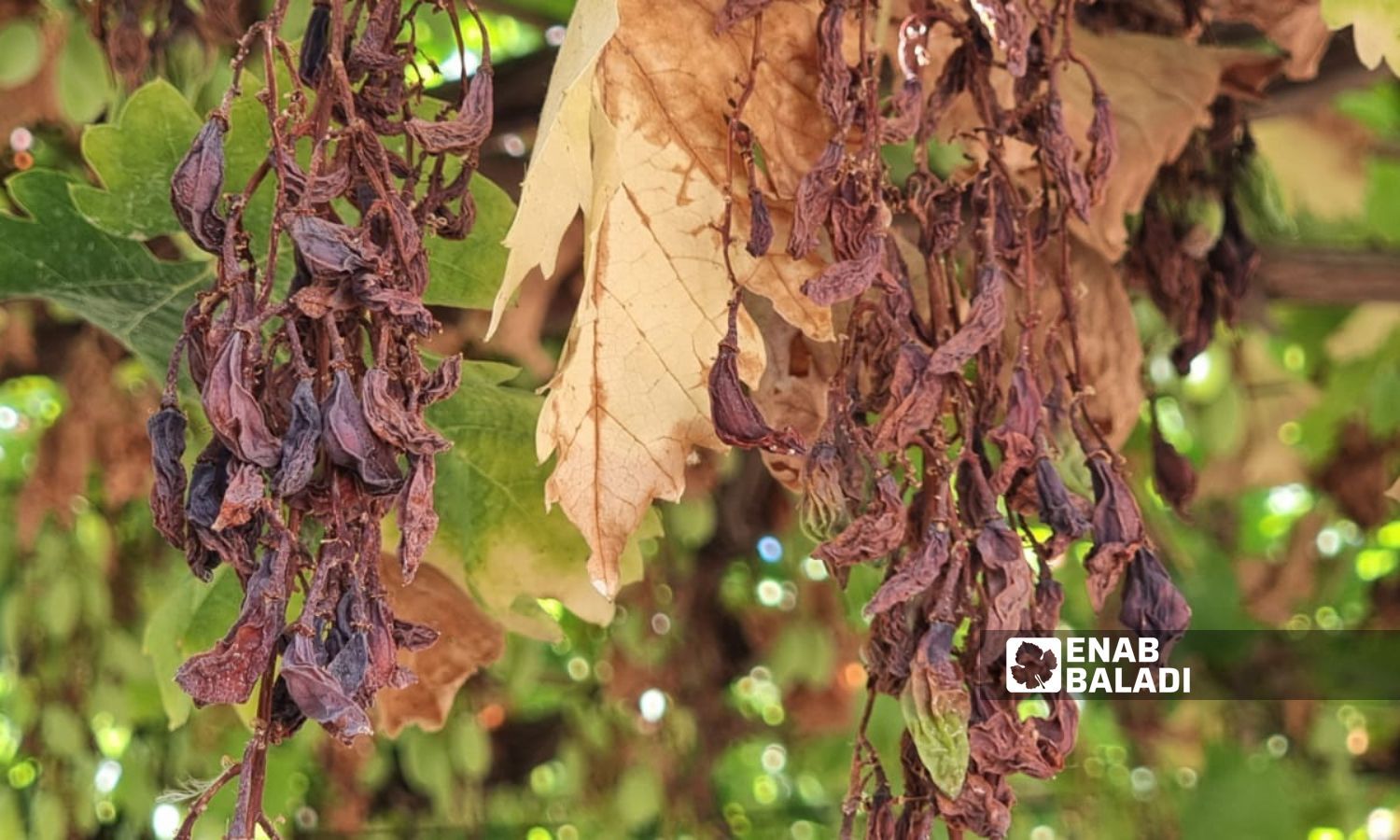



Idlib – Anas al-Khouli
Farmer Ali Samahi laments over his loss, describing it as a “back-breaking” one, after grape vines burned and were ruined due to weather fluctuations in Idlib, ranging between severe heat and rainfall during the planting season.
The farmer, displaced from the Damascus countryside, told Enab Baladi that this year, he leased 40 grape vines in the Harem area north of Idlib, which were estimated to produce eight tons of grapes, for $3,500, and spent $500 on care equipment, hoping to make a profit.
He mentioned that he used to pay money every season to “secure” the grape vines, adding that this year he spent all he had, but the weather fluctuations exhausted and burned the grape vines despite his attempts to mitigate the losses by spraying fertilizers and agricultural medicines to no avail.
When the grape vine “burns,” it means the leaves dry up and turn yellow, the grape berries shrivel and spoil.
The farmer described what befell the vines as a “disaster,” expecting that his best vines would produce no more than three kilos of grapes and that the return would not exceed $250 from 40 vines.
Grape orchards in Idlib, northwestern Syria, suffered severe damages, wiping out 95% of the agricultural season according to farmers’ estimates, due to weather fluctuations, high temperatures, and rainfall, causing tremendous losses for farmers.
Mustafa al-Mowahhed, deputy director of agriculture in the Syrian Salvation Government (SSG), stated to Enab Baladi that the grape crop was significantly damaged this year due to heatwaves, along with excessive leaf harvesting, which reduced production by more than 50%.
He explained that the number of grape vines in areas controlled by the Salvation Government is approximately 100,000 trees, with around 92,000 of them bearing fruit. He noted that the area planted with grapes is roughly 319 hectares.

The weather fluctuations led to the destruction of the grape crop in Idlib – June 23, 2024 (Enab Baladi/Anas al-Khouli)
The losses did not stop with the grape berries, as high temperatures and fungal diseases also affected the leaves and even the trees themselves. Farmers had to cut down several grape vines after they completely dried up, losing the efforts of years of care.
Grapes are considered very sensitive to weather fluctuations and fungal diseases, thus requiring intensive care.
The harvest time for grapes and vine leaves varies from one area to another depending on growth conditions and sunlight. However, the leaf harvest usually starts from June to October, with about 20 days between each harvesting.
The main agricultural pests that affect grapes include the Phylloxera insect on the roots, nematodes (eelworms), fruit worms, grape mites, red spiders, and aphids.
Grapes are also affected by viral diseases such as “mosaic,” yellow spot, leaf curl, increased cluster branching, and fruit drop. They can also suffer from various physiological diseases resulting from mineral deficiencies and other factors, and many fungal diseases such as downy mildew, powdery mildew, anthracnose, gray mold, red spot, and others.
Haytham Tabajo, another farmer who owns grape orchards in the Harem area, said that grapes are very sensitive plants, and the late winter this year exhausted the crop and the farmers.
He mentioned that farmers paid money for the spraying of the crop with fungicides, which harmed the vines, pointing out that he needed to spray the vines more than 25 times during this season.
According to the farmer, fungal diseases harmed all fruit trees such as peaches and apricots, but grapes were the most affected, causing many trees to die, which he had to cut down, wasting years of effort in caring for them.
The farmer added that the tree care costs this year exceeded $6,000 for fertilizers, pesticides, and irrigation. He hoped to compensate for these costs and make a profit, but the losses were “huge,” estimating his orchards’ production return to be only $2,500.
Farmers in Idlib usually benefit from selling grape leaves, which are used in some dishes.
Other farmers rely on selling unripe grapes (called Husrum) to make early profits before the grape season begins. However, farmers who delayed harvesting leaves and sour grapes this year did not get the chance to achieve any profits.
According to Tabajo, he started harvesting grape leaves and Husrum about two weeks ago and selling them in the markets, managing to collect $2,000. Still, he was waiting until the end of the season to harvest and sell smaller and medium-sized leaves, but the heatwave destroyed them.
Grapes are a favored fruit among Syrians, with the price of a kilo of grapes in 2023 reaching $1.50, which is high compared to the living conditions and workers’ daily wages, which do not exceed three dollars.
Farmers anticipate that the demand for grapes this year will be low due to the diseases affecting the crop.
This year saw significant weather fluctuations, including heavy rains in May, resulting in floods that damaged summer crops and displaced people’s tents.
The Syria Civil Defence told Enab Baladi at the time that the damage to agricultural lands was mainly concentrated in the Bahouri and Bir al-Tayeb areas west of Maarat Misrin in the Idlib countryside, where about 200 dunums of lands planted with summer vegetables like cucumbers, zucchini, and tomatoes were damaged by a flood that swept through and eroded the crops.
if you think the article contain wrong information or you have additional details Send Correction